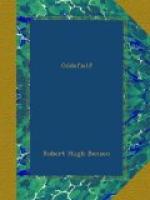I stood, as I said, upon a little scaffold to the right of the entrance; and I was glad of it; for there was a great pack of people crowded in, as the custom was, also to see the spectacle; and they were all about me and in front, as well as in the gallery where the music was.
The Banqueting Hall had its walls all hung over with very rich tapestry, representing all kinds of merry scenes of hunting and fighting and the like, and there were great presses along the walls, piled with plate of gold and silver. The music was all on the balusters above—wind-music, trumpets and kettledrums, that played as Their Majesties came in, after the heralds and Black Rod. I had not had before an opportunity of seeing the Queen so well as I saw her now; and I watched her closely, for I was sorry for the poor woman. She was very gloriously dressed in a pale brocade, with quantities of Flanders lace upon her shoulders and at her elbows, that set off her little figure very well. She was very handsome, I thought, though so little; and her complexion and her face were both very good, except that her teeth shewed too much as she smiled. She had, however, nothing of that witty or brilliant air about her that pleased the King so much in women; and she sat very quietly throughout supper, beside the King, not speaking a great deal. But I thought I saw in her at first a very piteous desire to please him; and he listened, smiling, as a man might listen to a dull child; and, indeed, I think that that was all that he thought of her. His Majesty himself appeared very noble and gallant, in His Order of the Garter, and with the Golden Fleece too, over his rich suit. Both Their Majesties wore a good number of jewels.
Their Majesties sat at a little high table, under a state, with their gentlemen and ladies standing behind them; and the Spaniards, with the King’s other guests at a table that ran down the middle of the hall, yet close enough at the upper end for the Ambassador and the King to speak together. My Lord Shaftesbury was there; and it was strange to see him, I knowing how much he was privately under His Majesty’s displeasure, and Prince Rupert, very fat and pale and stupid; and Sir Thomas Killigrew and a score of others. His Majesty was served by the Lords and pensioners; and the rest by pages and the like, and gentlemen. About the middle of the dinner toasts were drunk—and first of all His Majesty’s, and the trumpets sounded and the music played, all standing, and when they were sat down again I heard the guns shot off at the Tower; and I thought of him who lay there, and how he heard them near at hand, and how he might have been here, supping with the Spaniards, had he not fallen under the popular displeasure on account of his religion. It was a wonderful thing to see the toast drunk, all that company standing upon its feet, and shouting.
When the banquet came in, and the French wines, a very curious scene of disorder presently began—these gentlemen flinging the dessert about and at one another, for they were beginning to be a little drunk: and I saw Killigrew fling a bunch of raisins at one of the Spaniards, in sport. His Majesty sat smiling throughout, not at all displeased; but not drunk at all himself; and indeed he seldom or never drank to excess nor gamed to excess, though he loved to see others do so.




